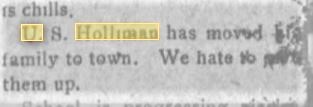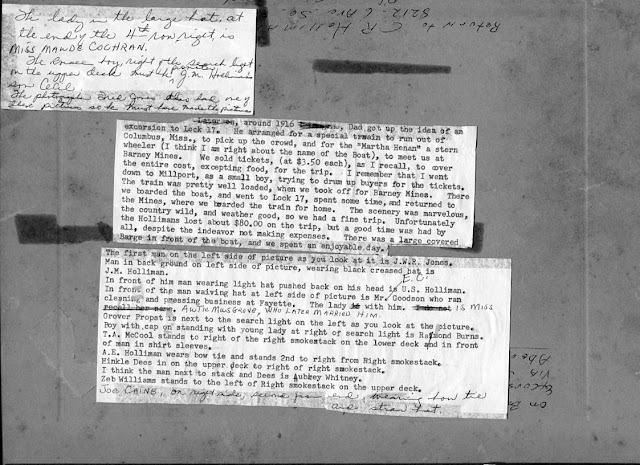by Glenn N. Holliman
My Grandfather made a Decision to Relocate. The Decision reverberates to this Day.
He closed his barber shop when he married and started farming again, the worn out soil of Fayette County, Alabama. He had married Pearl Caine Holliman in November1907. He began engaging in civic affairs being listed as an election officer in 1910. This interest in politics which he shared with several of his brothers would result in him running for the state legislature in the 1930s and 1940s as a Republican.
Children came rapidly for the young couple - Melton 1909, Vena 1910, Euhal 1912 and Loudelle 1914. The clippings that follow are from the Fayette, Alabama newspaper.
1910
So in 1912, Ulyss, his wife, Pearl and his first three children moved to town, Fayette, Alabama. My late father believed Ulyss worked in the lumber yard.
1912
1913
The far left child is Vena Holliman Daly and Melton P. Holliman on the far right. The remaining children may be cousins, perhaps the Lee Cook family.
1915
Vena Holliman Daly and Loudelle Holliman Ferrell taken in Fayette, Alabama,
1916
Occasionally, Ulyss had some fun such as this steam boat ride he took with two of his brothers in 1916. Can you see him in the far left, 2nd row with the hat pushed back on his head? This photograph was saved by Cecil Rhodes Holliman (1901-1986), son of James Monroe Holliman (1876-1940), father of Cecil and grandfather of Rhodes B. Holliman (1928-2014). Rhodes' son, Dr. Jim Holliman, resides in Hershey, Pennsylvania. His second cousin, once removed (this writer) and wife Barbara, often visit Jim and his wife, Karen, who live an hour away from our home in Newport, Pennsylvania. The copy in the second picture is from Cecil, a first cousin to my father, Bishop Holliman (1919-2018).
The Fateful Dinner of September 1915
Floyd Caine, the only brother of my grandmother, Pearl Caine Holliman, had moved to Irondale, Alabama, a suburb of Birmingham, the "Magic City" which experienced explosive growth for its first 50 years. Floyd was labeled a doctor in this article. That is exaggeration as he was a pharmacist who had left the farm life in Fayette County and acquired rudimentary skills of pills and tonics. All four families recorded in the second paragraph would follow Floyd by late 1917 to reside in Irondale. They were his parents and three sisters. Ulyss was not in attendance; he must have been with the children.
What did they discuss that visit? Impressed they must have been by Floyd's economic success. Economic opportunities were limited in Fayette and the the Cooks and Hollimans had large families to feed. By 1917 the decision was made leave Fayette, the home of the Hollimans since 1836. Life would change forever for their children and opened up vistas for the grandchildren that would follow.
1918
This newspaper clipping in early 1918 confirms Ulyss had taken his family to Birmingham.
By 1918 the Hollimans and Caines made Irondale their homes. The Cooks would follow. Ulyss acquired a carpenter's job with the Birmingham Electric Company which owned the streetcar line. He would work for them until retirement in 1949. Occasionally Ulyss experienced mishaps in the big city.
1920
From the Birmingham News
We don't know if Ulyss ever recovered this money, probably equivalent of a week's pay. We know in 1940 his annual salary was $1,600. Did he lose his wallet on the street car to a light fingered thief? Perhaps. My father remembered an occasion when his father, very ticklish, was a window seat passenger on the street car coming home holding a package of meat for the family. A 'friend' tickled him, playfully, and Ulyss, surprised, threw up his arms and the package went sailing out an open window. No hamburger that night in Irondale.
1960
The Singer Barber Sings Again!
Cousin Pam Holliman, my Uncle Ralph Holliman's daughter, found this clipping from the Birmingham News. Uylss, age 76, could still belt out a song as pictured above! I never saw him sing; in fact I never saw him smile. His grandchildren missed a lot. He passed away in 1965, age 81. Oh, I wish I could have heard him sing. - GNH
1960





















